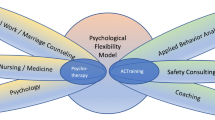Abstract
Acceptance and Commitment Therapy (ACT) is a behavior-analytically-based psychotherapy approach that attempts to undermine emotional avoidance and increase the capacity for behavior change. An overview of this approach is given, followed by several specific examples of the techniques used within ACT. In each instance the behavioral rationale of these techniques is described. A contemporary view of verbal relations provides the basis for new approaches to adult outpatient psychotherapy.
Similar content being viewed by others
References
Barlow, D. H., Hayes, S. C., & Nelson, R. O. (1984). The scientist-practitioner: Research and accountability in clinical and educational settings. New York: Pergamon.
Biglan, A. (1990). A contextual approach to treating family distress. In G. Singer & L. Irvin (Eds.), Supporting the family: Enabling a positive adjustment to children with disabilities (pp. 299–311). Baltimore: Paul H. Brookes.
Hayes, S. C. (1984). Making sense of spirituality. Behaviorism, 12, 99–110.
Hayes, S. C. (1987). A contextual approach to therapeutic change. In N. S. Jacobson (Ed.), Psychotherapists in clinical practice: Cognitive and behavioral perspectives (pp. 327–387). New York: Guilford.
Hayes, S. C. (Ed.). (1989). Rule-governed behavior: Cognition, contingencies, and instructional control. New York: Plenum.
Hayes, S. C., Afari, N., McCurry, S. M., & Wilson, K. (1990, May). The efficacy of comprehensive distancing in the treatment of agoraphobia. Poster presented at the 16th annual convention of the Association for Behavior Analysis, Nashville, TN.
Hayes, S. C., Brownstein, A. J., Devany, J. M., Kohlenberg, B. S., & Shelby, J. (1987). Stimulus equivalence and the symbolic control of behavior. Mexican Journal of Behavior Analysis, 13, 361–374.
Hayes, S. C., & Hayes, L. J. (1989). The verbal action of the listener as a basis for rule-governance. In S. C. Hayes (Ed.), Rule-governed behavior: Cognition, contingencies, and instructional control (pp. 153–190). New York: Plenum.
Hayes, S. C., & Hayes, L. J. (1992). Verbal relations and the evolution of behavior analysis. American Psychologist, 47, 1383–1395.
Hayes, S. C., Hayes, L. J., & Reese, H. W. (1988). Finding the philosophical core: A review of Stephen C. Pepper’s World hypotheses. Journal of the Experimental Analysis of Behavior, 50, 97–111.
Hayes, S. C., Hayes, L. J., Reese, H. W., & Sarbin, T. R. (Eds.). (1993). Varieties of scientific contextualism. Reno, NV: Context Press.
Hayes, S. C., Kohlenberg, B. S., & Hayes, L. J. (1991). Transfer of consequential functions through simple and conditional equivalence classes. Journal of the Experimental Analysis of Behavior, 56, 119–137.
Hayes, S. C., Kohlenberg, B. S., & Melancon, S. M. (1989). Avoiding and altering rule control as a strategy of clinical treatment. In S. C. Hayes (Ed.), Rule-governed behavior: Cognition, contingencies, and instructional control (pp. 359–385). New York: Plenum.
Hayes, S. C., & Melancon, S. M. (1989). Comprehensive distancing, paradox, and the treatment of emotional avoidance. In M. Ascher (Ed.), Paradoxical procedures in psychotherapy (pp. 184–218). New York: Guilford.
Hayes, S. C., Strosahl, K., & Wilson, K. D. (in press). Acceptance and Commitment Therapy. New York: Guilford.
Hayes, S. C., & Wilson, K. G. (1993). Some applied implications of a contemporary behavior-analytic account of verbal events. The Behavior Analyst, 16, 283–301.
Khorakiwala, D. (1991). An analysis of the process of client change in a contextual approach to therapy. Unpublished doctoral dissertation, University of Nevada, Reno.
Kohlenberg, B. S., Hayes, S. C., & Hayes, L. J. (1991). The transfer of contextual control over equivalence classes through equivalence classes: A possible model of social stereotyping. Journal of the Experimental Analysis of Behavior, 56, 505–518.
Kohlenberg, R. J., Hayes, S. C., & Tsai, M. (1993). Radical behavioral psychotherapy: Two contemporary examples. Clinical Psychology Review, 13, 579–592.
Kohlenberg, R. J., Tsai, M., & Dougher, M. J. (1993). The dimensions of clinical behavior analysis. The Behavior Analyst, 16, 271–282.
McCurry, S. M. (1991). Client metaphor use in a contextual form of therapy. Unpublished doctoral dissertation, University of Nevada, Reno.
McCurry, S. M., & Hayes, S. C. (1993). Metaphor: A basic and applied analysis. Clinical Psychology Review, 12, 763–785.
Sidman, M., & Tailby, W. (1982). Conditional discrimination versus matching to sample: An expansion of the testing paradigm. Journal of the Experimental Analysis of Behavior, 37, 5–22.
Wulfert, E., & Hayes, S. C. (1988). The transfer of conditional sequencing through conditional equivalence classes. Journal of the Experimental Analysis of Behavior, 50, 125–144.
Zettle, R. D. (1984). Cognitive therapy of depression: A conceptual and empirical analysis of component and process issues. Unpublished doctoral dissertation, University of North Carolina at Greensboro.
Zettle, R. D., & Hayes, S. C. (1986). Dysfunctional control by client verbal behavior: The context of reason giving. The Analysis of Verbal Behavior, 4, 30–38.
Zettle, R. D., & Raines, J. C. (1989). Group cognitive and contextual therapies in treatment of depression. Journal of Clinical Psychology, 45, 438–445.
Author information
Authors and Affiliations
Additional information
Preparation of this manuscript was supported in part by Grant DA08634 from the National Institute on Drug Abuse.
Rights and permissions
About this article
Cite this article
Hayes, S.C., Wilson, K.G. Acceptance and Commitment Therapy: Altering the Verbal Support for Experiential Avoidance. BEHAV ANALYST 17, 289–303 (1994). https://doi.org/10.1007/BF03392677
Published:
Issue Date:
DOI: https://doi.org/10.1007/BF03392677




